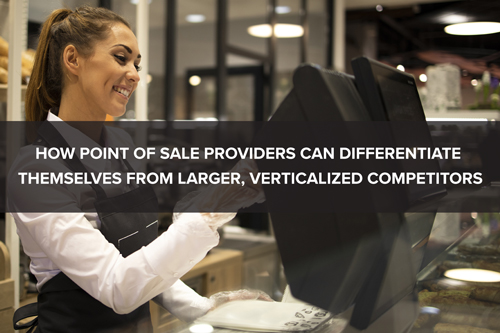 In today’s competitive landscape, independent Point of Sale (POS) providers face a significant challenge: differentiating themselves from larger, verticalized POS offerings from merchant services providers. These giants often bundle hardware, software, and payment processing into all-in-one solutions, making it difficult for smaller providers to carve out a niche. However, with strategic differentiation, independent POS providers can not only compete but thrive. Here’s how:
In today’s competitive landscape, independent Point of Sale (POS) providers face a significant challenge: differentiating themselves from larger, verticalized POS offerings from merchant services providers. These giants often bundle hardware, software, and payment processing into all-in-one solutions, making it difficult for smaller providers to carve out a niche. However, with strategic differentiation, independent POS providers can not only compete but thrive. Here’s how:
- Focus on Flexibility and Customization
Many larger providers offer rigid, one-size-fits-all solutions that may not fully meet the specific needs of merchants. Independent POS providers can set themselves apart by offering:
- Modular systems that allow merchants to select only the features they need.
- Industry-specific customizations tailored to unique workflows (e.g., a POS system that integrates seamlessly with a brewery’s keg tracking system or a salon’s booking software).
- Flexible integrations with a variety of third-party applications, rather than locking merchants into proprietary ecosystems.
- Offer Transparent Pricing with No Hidden Fees
One major pain point for merchants using verticalized POS systems is opaque pricing structures that bundle software costs with merchant processing fees. Independent providers can stand out by:
- Providing clear, upfront pricing with no long-term contracts or surprise rate increases.
- Offering transparent transaction fees, allowing merchants to choose their payment processor.
- Creating subscription-based pricing models that separate software from processing, giving merchants more control over their costs.
- Emphasize Payment Processing Flexibility
Many large POS providers force merchants to use their in-house payment processing services, often at higher-than-market rates. Independent providers can differentiate by:
- Supporting multiple payment processors, giving merchants the freedom to negotiate better rates.
- Enabling alternative payment options, such as cryptocurrency, BNPL (Buy Now, Pay Later), or mobile wallets.
- Offering interchange-plus pricing rather than flat-rate pricing, ensuring merchants get competitive rates.
- Deliver Personalized Customer Support
Larger providers often struggle with customer service due to their scale, leaving merchants frustrated with long wait times and unhelpful responses. Independent POS providers can stand out by:
- Offering dedicated account managers or priority support for high-value customers.
- Providing 24/7 live customer support with real human interaction instead of chatbots.
- Creating self-service knowledge bases with clear, helpful documentation and troubleshooting guides.
- Develop Niche-Specific Features
Verticalized POS providers may not always cater to the unique needs of niche markets. Independent providers can gain an edge by building solutions tailored to specific industries, such as:
- Restaurants: Advanced kitchen display system (KDS) integrations and ingredient-level inventory tracking.
- Retail: AI-powered upselling recommendations and real-time stock updates.
- Service Businesses: Built-in CRM tools and automated appointment reminders.
- Prioritize Data Ownership and Security
Many merchants are wary of handing over their customer data to large POS companies that also control their payment processing. Independent providers can appeal to privacy-conscious merchants by:
- Ensuring merchants own their customer data and are not locked into a single ecosystem.
- Implementing advanced security measures such as P2PE/E2EE and tokenization.
- Providing GDPR and PCI compliance to enhance data protection.
- Leverage Local Expertise and Community Engagement
Unlike large, national POS providers, independent companies can build strong local relationships by:
- Partnering with local business organizations and networking groups.
- Offering on-site setup and training to make implementation seamless.
- Providing localized marketing support, helping merchants use their POS system to boost customer engagement.
- Invest in Emerging Technologies
Staying ahead of the curve with technology can give independent POS providers a competitive advantage. Consider developing:
- AI-powered analytics to provide actionable insights on sales trends and customer behavior.
- Contactless and self-checkout solutions to meet evolving consumer expectations.
- IoT-enabled POS systems that integrate with smart devices in the business environment.
While larger, verticalized POS providers may have size and resources on their side, independent POS companies can differentiate themselves through flexibility, transparency, superior customer service, and niche expertise. By focusing on these key areas, smaller providers can build strong relationships with merchants and create loyal customers who appreciate the freedom and personalization they offer.
By embracing innovation and focusing on merchant needs, independent POS providers can carve out a profitable and sustainable position in the market.



